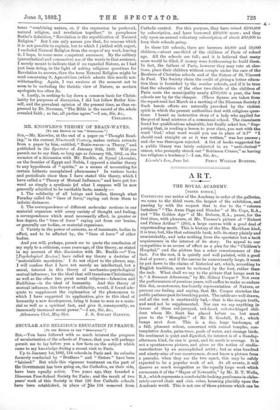MR. KNOWLES'S THEORY OF BRAIN-WAVES.
[TO THE EDITOR OF THE "SPECTATOR."]
Sra,---Mr. Knowles, at the end of a paper on "Thought Read- ing," in the current Nineteenth Century, makes certain extracts from a paper by him, entitled, " Brain-waves—a Theory," and published in the Spectator of January 30th, 1869. Will you permit me to say that, so long ago as January 9th, 1862, on the occasion of a discussion with Mr. Buckle, at Syene (Asoutin),
on the frontier of Egypt and Nubia, I opposed a similar theory -to any hypothesis of " spirits," as a means of accounting for
-certain hitherto unexplained phenomena ? In various books and periodicals since then I have stated this theory, which I have called a " Theory of Mutual Influence," and have put for- ward as simply a synthesis [of what I suppose will be now generally admitted to be verifiable facts, namely :— 1. The solidarity of all beings and bodies, through what Faraday called the " lines of force," raying out from them to infinite distances.
2. The correspondence of different molecular motions in our material organism with every variety of thought and feeling,
a correspondence which must necessarily affect, in greater or less degree, the " lines of force " raying out from our brains, -or generally our bodies, or material organisms.
3. Variety in the power of animate, as of inanimate, bodies to affect, and to be affected by, the "lines of force" of other bodies.
And you will, perhaps, permit me to quote the conclusion of my reply to a criticism, some years ago, of this theory, as stated in my account of this discussion with Mr. Buckle :—" You [Psychological Review] have called my theory a doctrine of materialistic mysticism.' I do not object to the phrase, nay, I will confess that I have not merely an intellectual, but a moral, interest in this theory of mechanico-psychological mutual influence ; for the ideal that will transform Christianity, as well as the other two great moral religions—Islamism and
Buddhism—is the ideal of humanity. And this theory of mutual influence, this theory of solidarity, would, if found ade- quate to supplement the explanation of the phenomena to which I have suggested its application; give to this ideal of humanity a new development, bring it home to men as a mate- -rial as well as a spiritual fact, and give it, consequently, an immensely increased moral power."—I am, Sir, &c.,














































 Previous page
Previous page